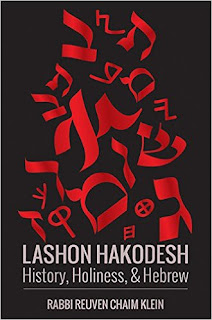Roots and Rituals: Insights into Hebrew, Holidays, and History
by Mitchell First (Kodesh Press, 2018)
https://amzn.to/2KQziXO
SPECIAL GUEST POST
Reviewed by Rabbi Rabbi Reuven Chaim Klein
I must say that once again, First comes in first place. This book is not simply comprised of three separate sections, rather every chapter is chock-full of insights into history, liturgy, and the Hebrew language. I must also say that I admire Mr. First's daring use of alliteration (the literary device which joins alimony with allegory) in his book's title. Of course, only two-thirds of that title mirrors that of my first book Lashon HaKodesh: History, Holiness, & Hebrew.
Mr. First's book appeals to and is readable by the scholar and layman alike, to the Talmid Chacham and Am HaAretz, to the serious scholar and the cynical boor. As an avid reader of Mr. First's weekly articles in the Jewish Link of New Jersey, I appreciate the humor in his ever-changing byline, and was glad to see that those bylines appeared at the end of each article in his new books, as well.
The section on liturgy delves into things which we take for granted and explains their origins. For example, Mr. First tells us about the origins of the Haftarah, saying Shema in the Kedushah of Mussaf, Mizmor Shir Chanukas HaBayis (for those of us who come to Shul on time) in the beginning of Shachris, and when we started saying Aleinu at the end of davening. Of course, he draws from a broad spectrum of sources, running the gamut from the Complete ArtScroll Siddur to the scholarly works of Dr. Yisroel Ta-Shema, from Rabbi Aryeh Kaplan to the maskil Naftali Herz Tur-Sinai (Torczyner).
He asks questions like why in Grace After Meals do we refer to G-d's "full, open, holy, and abundant" hand; what is the word "holy" doing there?
When talking about the blessing of the gender-specific blessings of Birkas HaShachar, he compares those blessing to similar statements made by ancient Greek philosophers. Mr. First's judicious use of manuscripts makes his research all the more meaningful, especially when he brings to light overlooked variations that actually make big differences.
Indeed, these examples are just a sampling of Mr. First's way of presenting the fruits of his arduous research into the interplay of Jewish Tradition with archeology and established history. Mr. First is not not scared of offering creative, original explanations and rejecting what scholars before him understood to be fact. Although, as a word of caution, I must say that Mr. First sometimes pushes the envelop concerning what is considered acceptable in Orthodoxy (for some people that's considered a good thing).
Segueing to his linguistic prowess, I am in awe of the way Mr. First seamlessly parses words in the Hebrew language by using both traditional and non-traditional sources. Such an approach is almost unparalleled in contemporary works. His language musings show the conceptual links between apparent homonyms in the Hebrew language, and sharpen the differences between apparent synonyms. Mr. First's Modern Orthodox affiliation broadens his Overton Window into allowing academic sources into the foray, alongside traditional ones. His etymological discussions refer to the research of Hayyim Tawil (who wrote a lexicon of Ancient Akkadian), Ernest Klein (who wrote an etymological dictionary of the various strands of Hebrew), and Matisyahu Clark (who also wrote an etymological dictionary of Hebrew, but this one is largely based on the ideas of Rabbi Samson Raphael Hirsch).
In his section about the holidays, Mr. First again tackles some of the phrases and ideas that we take for granted and sheds new light on their meaning (for Rosh HaShanah he offers a new understanding of the phrase Yom Teruah; for Chanukah, the background to the term Maccabi; and for Pesach, the deeper meaning of Haggadah). He also gives some important insights to the Jewish Calendar, and, of course he addresses one of his personal pet-peeves, the identity of the characters in the Book of Esther (see his previous book for more about that).
From time to time, Mr. First also gives us short biographical details of the people he cites--filling the book with interesting historical tidbits.
Finally, and, perhaps, most importantly, I must mention Mr. First's good sense of humor (if you can call puns "humor"). In fact, as we see throughout his awesome work, Mr. First has his way with words. One might even call him "a way-word Jew".

